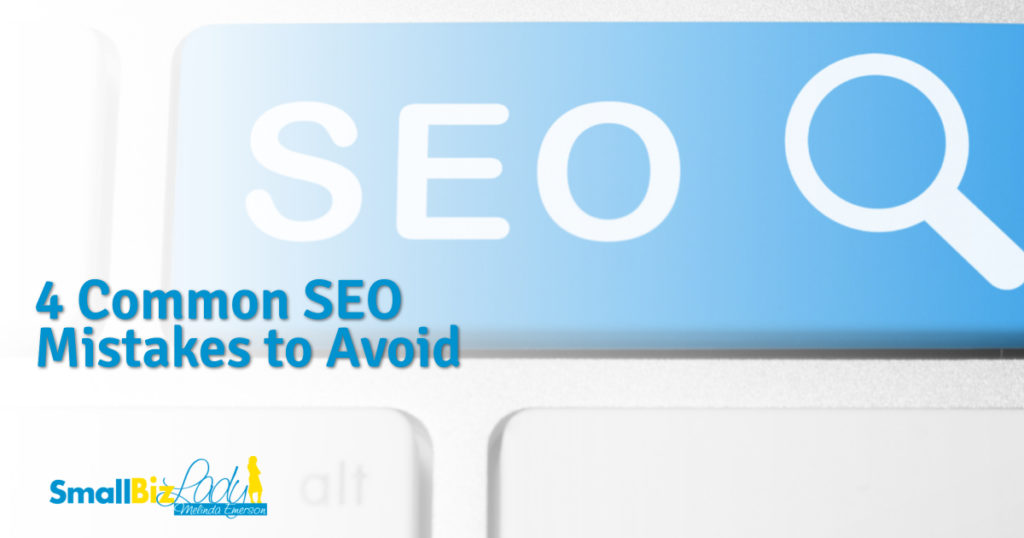4 Common SEO Mistakes to Avoid

 Not all of us are search engine savvy and being a small business, it is often too expensive to hire a third party to help with your business Search Engine Optimization (SEO) needs. But regardless of how big your small business is, there are four common SEO mistakes to avoid!
Not all of us are search engine savvy and being a small business, it is often too expensive to hire a third party to help with your business Search Engine Optimization (SEO) needs. But regardless of how big your small business is, there are four common SEO mistakes to avoid!
It can be a daunting task, yet, once the fundamentals of SEO are understood, it is not actually overly complicated. SEO is a long-term strategy and time-consuming if you want to do it right, however, once successful, the rewards can be a business game-changer.
#1. Not Planning Your SEO strategy
One of the most common and critical mistakes is not meticulously planning your SEO strategy and jumping straight in. If you own an existing website, it would be wise to first perform an SEO audit, this will provide you with a summary of how you are currently performing. There are numerous third parties (some offer free or discounted trials) that will do this for you. Quite often all you need to do is enter your business URL and they will do the rest for you. Example SEO software companies include Ahrefs, Moz, and SEMRush.

Initial SEO information you need to cover yourself include:
- Who is your target audience?
- Analyze your competition and what they are doing
- What are the keywords and terms you are targeting?
This information is critical in creating an effective and coherent SEO strategy.
#2. Failing to optimize and check your website
It is essential that you have your own house in order. Having a website with broken links, non-responsive design, large file sizes, duplicate content, missing pages, security issues, etc. is going to hurt any SEO efforts. It is well known that Google penalizes websites that contain some of the issues listed above. Be sure to sort your website out before commencing any new SEO strategies.

There are many free online applications that will do a lot of the hard work for you, some examples are listed below:
#3. Creating Poor Content
Make sure you look through your entire website and check the content. It needs to be relevant, literate, non-repetitive, fulfill the users’ needs, and working with your SEO goals. Not only does quality content help engage your site visitors and potentially create new customers, but it can also be used to help galvanize your SEO strategy. By making sure your website contains quality content, you have a higher chance of achieving search engine success. Quality content can help in the following way:
- Boost your authority with search engines
- Work in tandem with your keyword strategy and internal linking plan
- Reduce your bounce rate which can help Google rankings
#4. Failing to research Keywords
Too often businesses compile a list of keywords and target them immediately. You need to research them first, there could be a number of reasons why they will not yield the results you are looking for.

Once you have compiled a list of keywords you want to target, it would be wise to analyze the following information:
-
Who is also targeting them?
If it is your core competitors, then it is likely your target audience’s search using these terms.
In addition, if page one of Google results is full of large businesses, you might want to reassess targeting these words. It is likely their website has a high domain authority, thousands of incoming links with full-time SEO teams helping them achieve this. There is no point wasting your valuable time on terms that you will not rank high for. Use your valuable time targeting terms that are still searched for but will allow for higher rankings.
-
What is keyword difficulty?
This is usually scaled from 1-100%, the higher the number the more competitive and difficult it is to rank highly for the keyword. It is generally accepted anything above 70% is highly competitive. It does not mean it is impossible to rank highly for, however, it will require a massive effort and a lot of resources.
-
Targeting pointless terms
There is no point in being top of the search engines if no one searches for that term. Google (you will need an account) and other applications allow you to view the MSV (monthly search volumes). Please note that MSV is not the only metric to look at, high search volumes do not always relate to conversions.
Before embarking on any SEO campaign, it is vital to do your groundwork first. By researching your customers, your business, your competitors, and potential keywords you will be in a much stronger position to achieve search engine success. SEO is time-consuming, you need to designate set hours and stick to them. However, if conducted methodically and patiently, the results can transform your business.
 About the Author: Gavin Kilgallon is a Director at ID Studio Web agency, based in London, UK. Gavin has been working in the web design industry for over twenty years.
About the Author: Gavin Kilgallon is a Director at ID Studio Web agency, based in London, UK. Gavin has been working in the web design industry for over twenty years.
Read More
Source

No comments